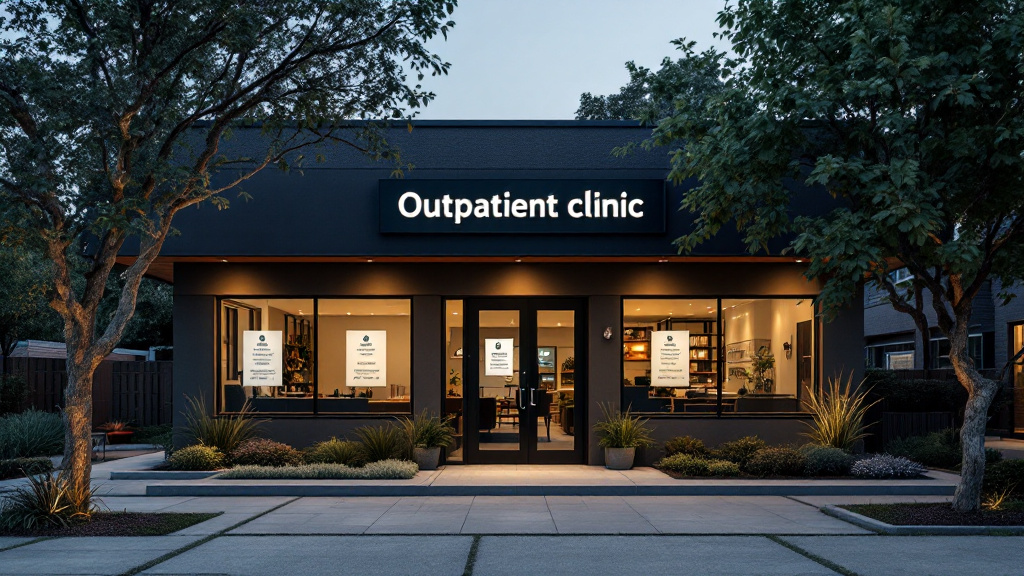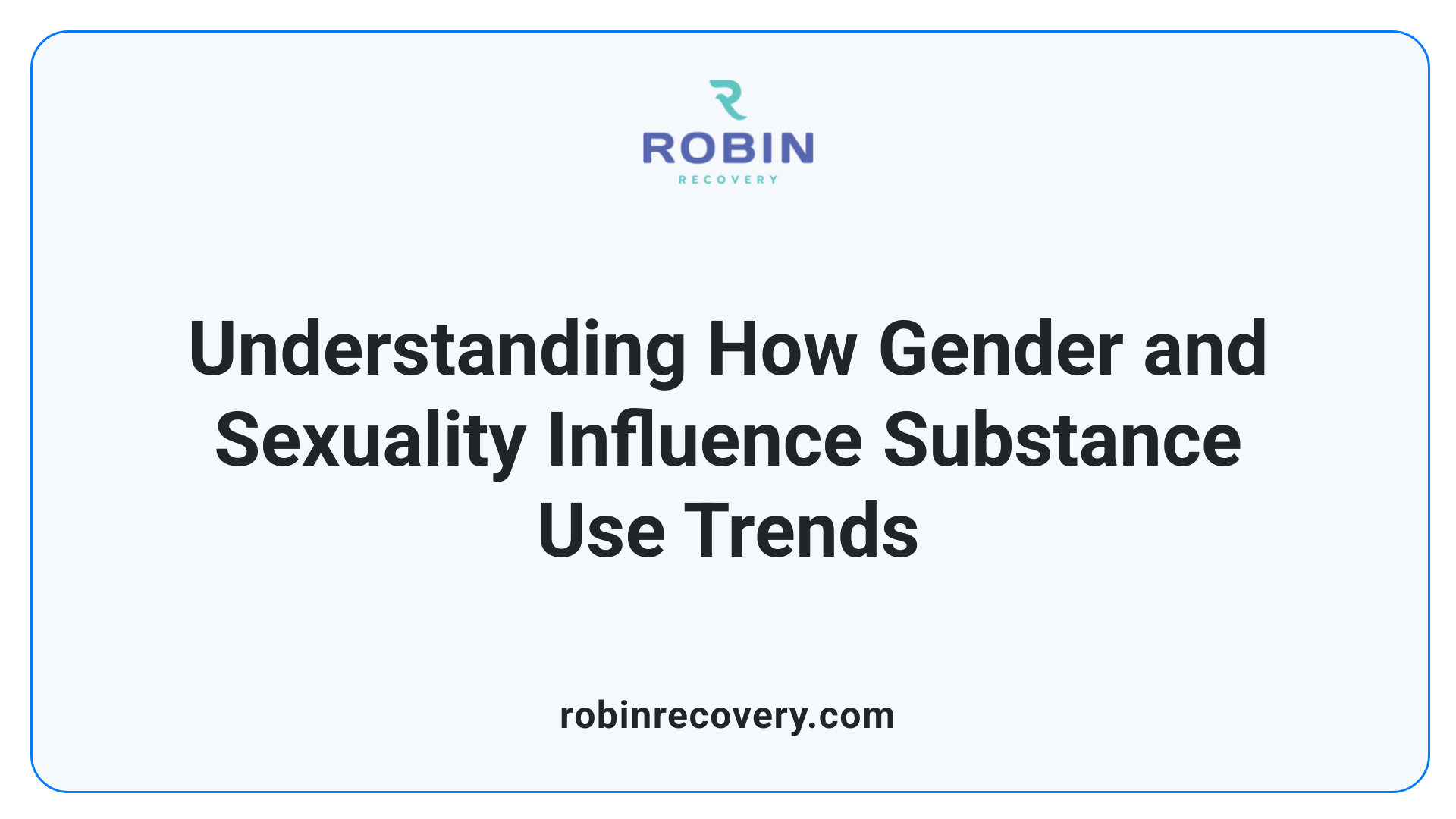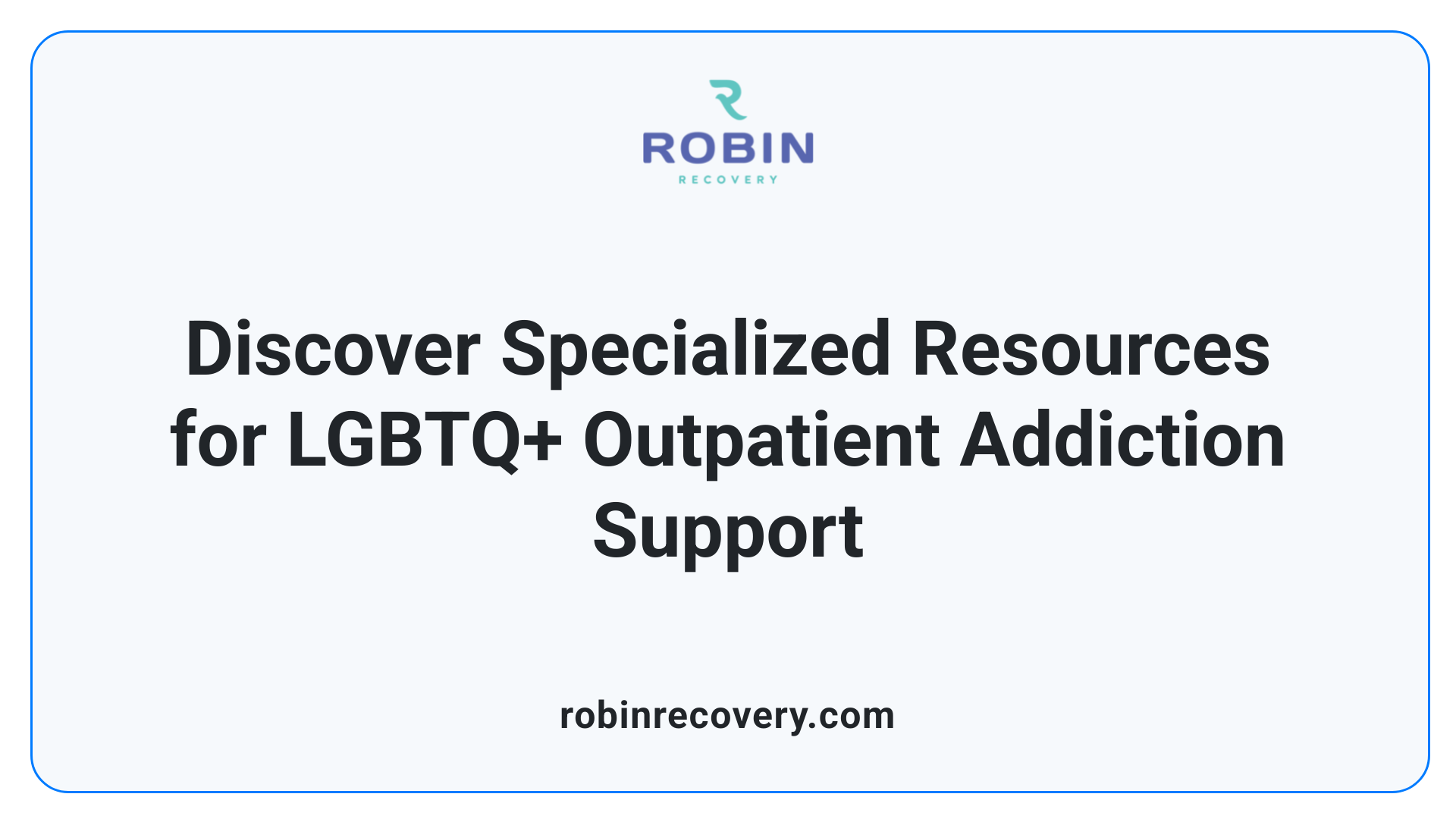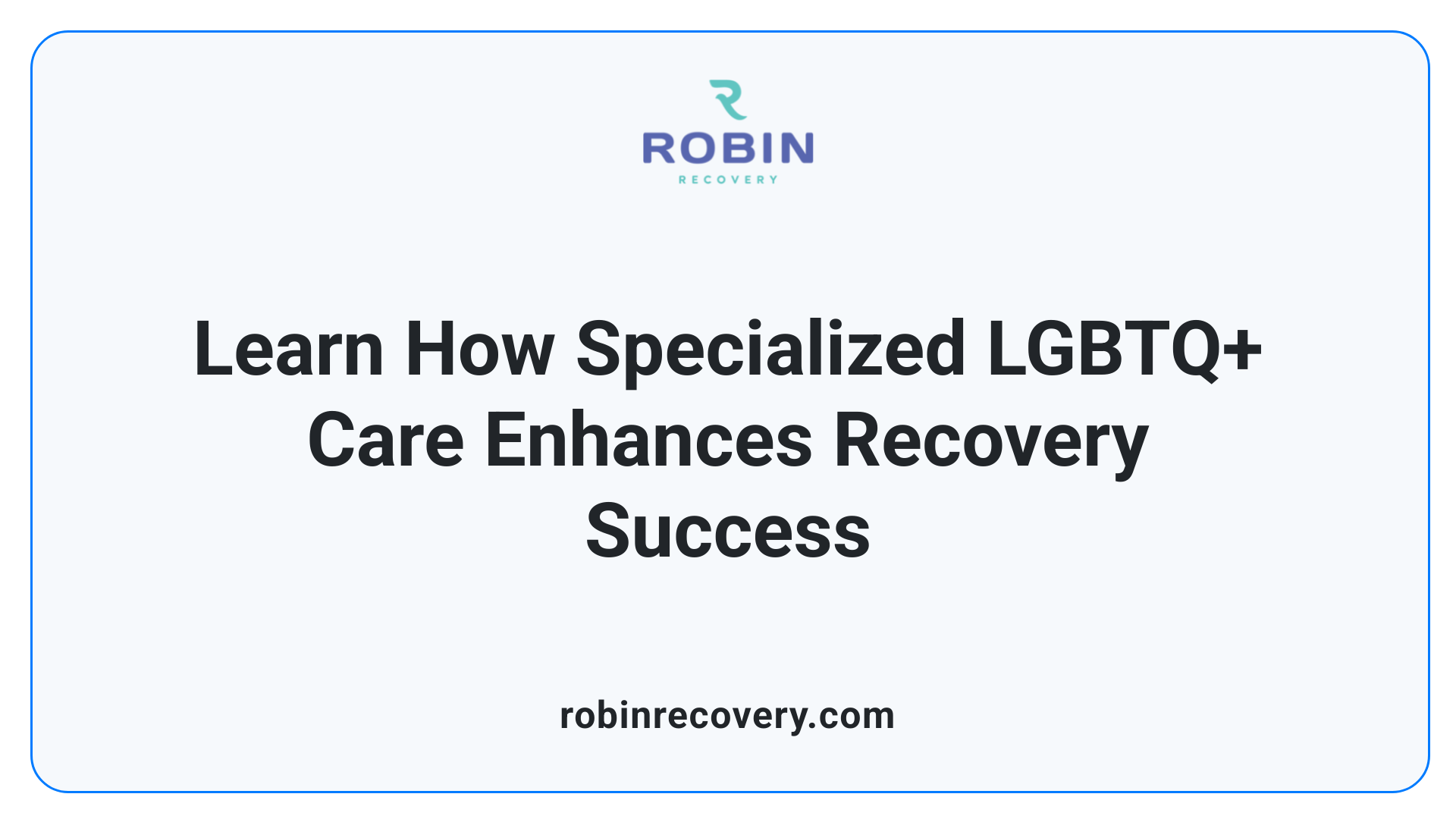Difficulty Finding an Outpatient Drug Rehab That Serves the LGBTQ Population?

Addressing Unique Challenges and Expanding Resources for LGBTQ+ Addiction Treatment
The journey to recovery for LGBTQ+ individuals often encounters significant hurdles, largely due to the scarcity of specialized outpatient drug rehab programs that understand and accommodate their unique needs. Despite the higher prevalence of substance use disorders—up to 30% of the community compared to about 9% in the general population—there remains a substantial gap in culturally competent, affirming treatment options. This article explores the barriers faced by LGBTQ+ populations in accessing outpatient rehab services, the characteristics of effective LGBTQ-affirming programs, and the resources available across the country. It emphasizes the importance of addressing societal stigma, enhancing provider training, and expanding inclusive services to improve recovery outcomes.
The Impact of Gender Identity and Sexual Orientation on Substance Use Patterns

How do discrimination and minority stress influence coping strategies among LGBTQ+ individuals?
Discrimination and minority stress are primary factors impacting substance use among LGBTQ+ populations. Constant exposure to societal prejudice, harassment, and misgendering creates a chronic state of stress that many seek to cope with through substances. Experiences of rejection at work, in social settings, or within the family often lead individuals to turn to alcohol, drugs, or marijuana to temporarily relieve anxiety and feelings of isolation. These coping mechanisms, while providing short-term relief, often increase the risk of developing substance use disorders.
LGBTQ+ individuals frequently encounter barriers to consistent healthcare, including lack of culturally competent providers. When affirming care is unavailable, feelings of alienation intensify, making it harder for individuals to seek help. Supportive communities and inclusive policies play a vital role in decreasing minority stress, enabling healthier coping strategies.
What is the role of societal prejudice in worsening mental health issues that lead to substance use?
Societal prejudice creates an environment that fosters mental health challenges such as depression, anxiety, and post-traumatic stress disorder among LGBTQ+ persons. Persistent discrimination often leads to internalized homophobia or transphobia, which erodes self-esteem and fosters feelings of shame.
This internal conflict heightens the likelihood of turning to substances as a form of self-medication. Studies show that higher rates of substance abuse in LGBTQ+ communities are closely linked to these psychosocial stressors.
Moreover, treatment settings that lack understanding or sensitivity toward LGBTQ+ issues may discourage individuals from seeking help. Conversely, LGBTQ+-affirming services can reduce mental health disparities and break the cycle of substance misuse driven by societal prejudice.
How does internalized homophobia impact self-esteem and contribute to substance dependency?
Internalized homophobia refers to the internal acceptance of society’s negative attitudes towards LGBTQ+ identities. This internalization damages self-esteem and increases feelings of worthlessness.
Individuals struggling with internalized homophobia are more vulnerable to psychological distress, which often manifests as depression, anxiety, or self-harm tendencies. These emotional struggles can lead to increased substance use as a maladaptive coping strategy.
Substance dependence can stem from attempts to numb the pain associated with internalized negative beliefs. The cycle often worsens without targeted mental health support, emphasizing the importance of affirming, culturally sensitive treatment programs that help rebuild self-esteem and address underlying psychological issues.
Aspect Impact Additional Details Discrimination & Minority Stress Increases substance use as a coping mechanism Leads to higher mental health challenges and substance dependency Societal Prejudice Worsens mental health, resulting in increased substance abuse Internalized stigma diminishes self-worth Internalized Homophobia Lowers self-esteem, contributing to internal conflicts and substance reliance Hinders seeking help, sustains addictive behaviors
Addressing these issues through inclusive policies, mental health support, and culturally competent treatment environments is vital for improving health outcomes among LGBTQ+ populations.
Challenges in Accessing Outpatient Rehabs for LGBTQ+ People

Why is it more challenging for LGBTQ individuals to seek and access drug rehab services?
LGBTQ+ individuals often encounter multiple obstacles when trying to access addiction treatment. Societal stigma and discrimination can foster feelings of shame and fear, discouraging many from seeking help. Social rejection from family, friends, or their community further isolates them, making the path to recovery feel harder.
Moreover, the higher prevalence of homelessness among LGBTQ+ populations, especially youth, complicates access to consistent care. Trauma resulting from violence, harassment, or sexual abuse is also common and contributes to substance misuse, creating dual challenges for treatment.
Mental health issues such as depression, anxiety, and PTSD frequently co-occur with substance use in this community. These conditions can hinder individuals' ability to seek or benefit from treatment unless specific mental health support is integrated.
Healthcare inequalities further impede access. Many LGBTQ+ people face higher uninsured rates or feel uncomfortable disclosing their identity to healthcare providers, which can lead to a lack of culturally sensitive or affirming care.
A significant barrier is the limited availability of LGBTQ-specific treatment centers—currently, only 20-30% of treatment programs are tailored for the community. This scarcity discourages those who could benefit most.
The interplay of societal biases, mental health challenges, and healthcare gaps makes access to effective, affirming drug rehab services considerably more difficult for LGBTQ+ individuals. Overcoming these challenges requires increasing culturally competent services, expanding LGBTQ-focused facilities, and reducing social stigma associated with seeking help.
Availability of Resources and Support for LGBTQ Outpatient Addiction Treatment

Are there resources or support systems specifically designed for LGBTQ individuals seeking outpatient drug rehab? Yes, numerous organizations and treatment facilities offer tailored outpatient programs that cater to the unique needs of LGBTQ+ individuals. Facilities like Hazelden Betty Ford and the Pride Institute are well-known for providing specialized outpatient services that prioritize culturally competent care, gender-affirming practices, and trauma-informed approaches.
These programs often incorporate evidence-based therapies such as cognitive-behavioral therapy (CBT), family therapy, and holistic treatments. They also utilize telehealth options, which have become increasingly popular, to enhance accessibility for clients who may face geographical or social barriers to in-person care.
Beyond individual treatment programs, national organizations such as SAMHSA (Substance Abuse and Mental Health Services Administration), Mental Health America, and the National Alliance on Mental Illness (NAMI) play vital roles in providing resources and advocating for inclusive healthcare. They maintain directories of LGBTQ-friendly providers, promote community-based support systems, and push for policy changes that improve access to mental health and addiction services.
Community support systems include peer-led groups, online forums, and local organizations that foster an affirming environment and shared experience. These resources are essential for providing ongoing support, reducing stigma, and encouraging continued recovery.
In summary, dedicated outpatient treatment programs, telehealth services, and community-based resources are vital to ensure that LGBTQ+ individuals seeking help can find culturally sensitive and effective support tailored to their specific challenges.
Characteristics of Effective LGBTQ-Affirming Outpatient Programs

What challenges do LGBTQ individuals face when accessing addiction treatment, and are there specialized or affirming outpatient programs available?
LGBTQ individuals often encounter numerous barriers when seeking addiction treatment. Stigma, discrimination, societal rejection, and lack of culturally competent care can make it difficult for them to access the support they need. These challenges are compounded by social rejection, mental health disparities, and fear of judgment, all of which can deter individuals from pursuing treatment.
To address these issues, specialized outpatient programs have been developed. These programs, such as those offered by organizations like the Pride Institute and Hazelden Betty Ford, are designed to provide affirming, inclusive, and tailored services that recognize the unique experiences of LGBTQ people. They emphasize creating a safe space where clients feel accepted and understood.
Such programs typically include a variety of treatment options, from outpatient therapy to holistic approaches that address co-occurring disorders such as depression and anxiety. They may also incorporate inpatient or intensive outpatient components as needed for severe cases. These services are aimed at supporting both mental health and substance use recovery in a compassionate environment.
Staff at LGBTQ-affirming treatment centers are specially trained in cultural competence and sensitivity. They understand the specific stressors, trauma, and societal pressures faced by LGBTQ individuals. The environment is often made welcoming through visible symbols of acceptance, like rainbow flags or inclusive signage, which help foster trust and comfort.
A broad range of therapies is employed, including Cognitive Behavioral Therapy (CBT), Dialectical Behavior Therapy (DBT), family therapy, and holistic methods such as mindfulness and wellness practices. This comprehensive approach ensures personalized care that respects individual identities and needs.
Overall, specialized outpatient programs are essential for providing accessible, respectful, and effective treatment for LGBTQ individuals. They address the unique challenges faced by this community, offering a safe and supportive pathway to recovery and long-term wellness.
For those seeking more information, searching for
The Role of Specialized Care in Improving Treatment Outcomes

Why is it more challenging for LGBTQ individuals to seek and access drug rehab services?
LGBTQ+ individuals often face multiple barriers that make accessing addiction treatment difficult. Social stigma, discrimination, and rejection from family or the community can lead to feelings of isolation and mistrust of healthcare providers.
Additional obstacles include higher rates of homelessness and trauma, which intensify the struggle to seek help. Many face co-occurring mental health conditions like depression, anxiety, or PTSD, complicating the path to recovery.
Healthcare disparities further impede access—many LGBTQ+ persons are uninsured or fear disclosing their identity to providers due to potential bias or insensitivity. The scarcity of LGBTQ-specific treatment centers and culturally competent professionals adds to these challenges.
These overlapping issues create a complex environment where seeking and receiving effective treatment is significantly harder for LGBTQ+ community members. Addressing these barriers requires understanding their unique needs and ensuring accessible, affirming care.
Evidence that LGBTQ-specific programs lead to better outcomes
Research shows that LGBTQ-focused addiction treatment programs have higher success rates compared to general programs. These specialized centers provide affirming environments, culturally sensitive staff, and therapies tailored to address the unique challenges faced by LGBTQ+ individuals.
Studies indicate that participants in LGBTQ-specific programs experience better retention, higher abstinence rates, and improved mental health outcomes. For example, those in tailored environments are more likely to feel understood and supported, reducing feelings of shame and internalized stigma.
Furthermore, these programs often incorporate trauma-informed care, peer support, and gender-affirming practices, which are crucial for effective treatment. The sense of community and acceptance fostered in these settings helps sustain long-term recovery.
Importance of addressing co-occurring mental health issues
Substance use disorders in LGBTQ+ populations commonly occur alongside mental health conditions such as depression, anxiety, and PTSD.
Treating both issues simultaneously—integrated treatment—is essential for successful recovery. Addressing mental health challenges reduces the risk of relapse and supports overall well-being.
LGBTQ-specific programs are designed to manage these co-occurring issues compassionately and effectively. They include specialized therapies, psychiatric services, and medications when appropriate, tailored to the emotional and social realities of LGBTQ+ individuals.
This comprehensive approach recognizes the intertwined nature of mental health and substance use, offering a more holistic and supportive recovery journey.
Peer support networks and community engagement
Building strong peer support networks is vital for fostering resilience and community among LGBTQ+ individuals in recovery. Support groups led by or inclusive of LGBTQ+ members provide safe spaces for sharing experiences, challenges, and successes.
Community engagement through events, social activities, and mentorship programs helps reduce isolation and enhances feelings of belonging. These networks can also connect individuals with resources, advocacy, and ongoing support.
Organizations like Maryville and Golden Gate Recovery emphasize peer mentorship and community integration as part of their treatment plans. This social support significantly improves treatment adherence and long-term sobriety.
Culturally sensitive interventions, combined with robust peer networks, create a comprehensive framework that enhances recovery outcomes. Such approaches acknowledge the social dynamics that influence substance use and foster empowerment and self-acceptance.
Enhancing Access and Ensuring Equality in LGBTQ+ Addiction Recovery
Addressing the challenges faced by LGBTQ+ individuals in accessing outpatient drug rehab requires a multifaceted approach. Increasing the availability of LGBTQ-affirming facilities, training healthcare professionals in cultural competence, and reducing societal stigma are essential steps. Policy initiatives, community engagement, and expanding telehealth services can also bridge gaps in care. Recognizing the distinct needs of the LGBTQ+ population and integrating tailored support into mainstream addiction treatment infrastructures will improve recovery outcomes and promote health equity. Ensuring that every LGBTQ+ person seeking help finds a safe, inclusive, and effective treatment environment is not only a matter of healthcare improvement but also a fundamental step toward social justice.
References
- National Helpline for Mental Health, Drug, Alcohol Issues - SAMHSA
- Addiction in the LGBTQ Community & Finding Affirming Treatment
- The LGBTQ+ Community And Addiction - Addiction Center
- Difficulty Finding an Outpatient Drug Rehab that Serves the LGBTQ ...
- LGBTQ+ & Gay-Friendly Drug and Alcohol Rehab Centers Near Me
- LGBTQ Substance Abuse Treatment in CA - Golden Gate Recovery
- Drug Addiction in the LGBT Community - Promises Behavioral Health
- The Science Behind How Specialized Addiction Treatment Can ...
- Outpatient Drug Rehab | LBGTQ+ | LGBTQ Mental Health
